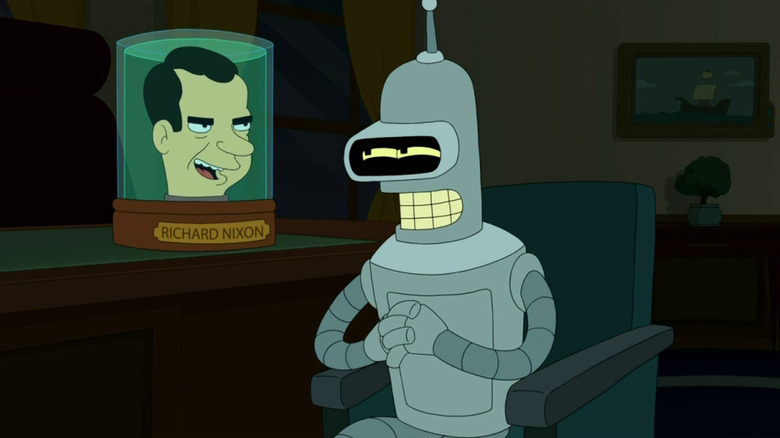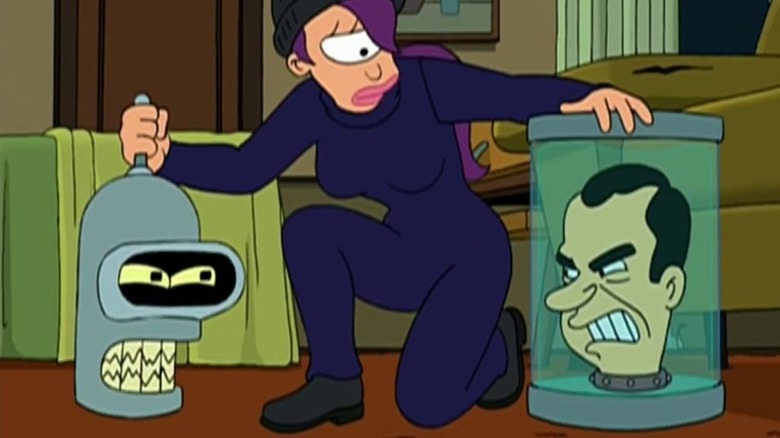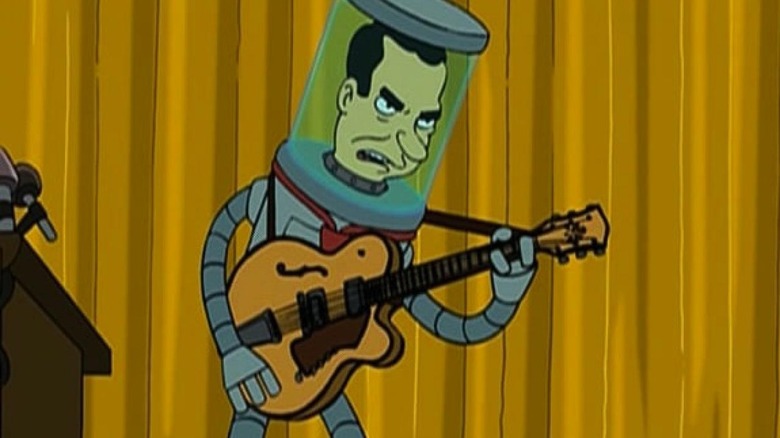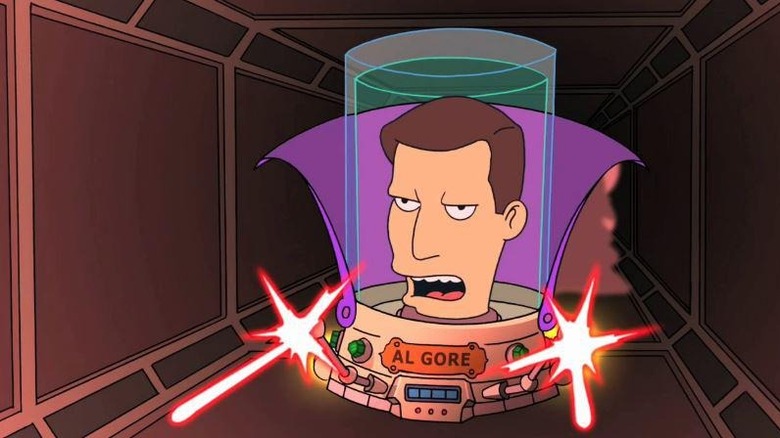Futurama's Portrayal Of Nixon Wasn't Always Well-Received
Matt Groening's and David X. Cohen's frequently resurrected sci-fi comedy series "Futurama" — a show set in the 31st century — had a clever conceit for incorporating modern-day celebrity cameos. In the future, it turns out, severed human heads can be kept alive in jars of mysterious, life-giving fluid, and an unseen team of enterprising head archivists collect history's celebrities' heads in a Head Museum. So if someone like Al Gore or Beck or Penn Jillette or the cast of "Star Trek" wanted to appear on "Futurama" as themselves, they would merely appear as their own heads.
The heads-in-jars gag also extended to include historical figures like Charles de Gaulle, Napoleon, and Charlie Chaplin, and could be employed for any number of wonderfully quick, cheap sight gags. It would also allow for Groening and Cohen to appear on "Futurama" as themselves — pitching a new show called "Futurella" set in the year 4000.
Because anyone from history can be resurrected in this context, it didn't take "the Futurama" writers long to bring in the long-dead Richard Nixon. Groening, the writers, and actor Billy West all had a great time mocking the former president, initially depicting him as a fascistic supervillain; West incorporated an old shtick of his wherein he would imitate Nixon transforming into a werewolf — the notorious Republican would frequently interject with a "Haroooo." Over the course of the show, Nixon becomes the President of Earth, and enacts all manner of wicked policies.
However, not everyone approved of Nixon's constant appearances on the show, especially given how the character would come to evolve. In a 2015 interview with Lightspeed Magazine, Cohen explained exactly why.
Nixon as a pop culture figure
Cohen began by explaining why they chose to have Nixon on the show at all, and the reason was simple: Even by the early 2000s, Richard Nixon was still a recognizable (and recognizably evil) caricature. Anyone familiar with the odd proclivities, outsize personality, and constant deceptions of the 37th president of the United States will understand immediately:
"The reason we did that was because we thought Richard Nixon is a great cartoon character in real life and makes an easy transition. I remember Matt Groening saying, 'If you had told me in the '70s that I was going to be able to make fun of Richard Nixon thirty years later, I would've been so happy.' It was one of those things that we thought would be a quick joke and that we'd do once or twice, but it ended up being a recurring thing."
Cohen's and Groening's instincts weren't wrong: Nixon has remained a strangely persistent presence in popular media for decades. 1996 saw the release of "Nixon," a bloated Oliver Stone biopic with Anthony Hopkins in the title role, while 1999 saw the release of a teen comedy, "Dick," about two none-too-bright teenage girls who unwittingly end up ousting the president. Nixon was a central figure in Zack Snyder's 2009 film version of "Watchmen," as well as in 2014's "X-Men: Days of Future Past." A fictionalized Nixon appeared onscreen most recently in "Elvis & Nixon," and the recent TV miniseries "Gaslit" was all about the Watergate scandal. We've always had Nixon to kick around.
The Richard Nixon Library
While U.S. Presidents can be portrayed and openly satirized in popular media without permission, Cohen did receive one letter asking politely for the showrunners at "Futurama" to perhaps reconsider:
"Early in the show, the network got a letter from the Richard Nixon Library or Estate, saying they weren't pleased with his portrayal, and would we consider not doing it. There's no legal reason we couldn't do it, because Presidents are fair game as public figures, which seems to be well established in U.S. law. But we didn't stop."
The Richard Nixon Presidential Library and Museum is located in Yorba Linda, CA, and can visited seven days a week. Curiously, the library had — at some point during the run of "Futurama" — begun to roll with Nixon's various criminal activities and scandals, understanding that the scandals are what Nixon is best known for. The library has digitized Nixon's infamous White House tapes and notes the anniversary of the Watergate break-in. This acknowledgement of Nixon as an ignominious figure came paired with a softening of the "Futurama" version of the president. This led to a change in attitude from the Nixon Library:
"The strange thing was — we didn't really do this consciously — but Nixon became less evil as it went along, and was more of a practical tyrant who had to put up with difficult aliens and annoying people. Perhaps that helped, or perhaps they just got used to it, but a few years later we got another letter asking for us to provide some materials, because they were going to do an exhibit about Nixon in popular culture and they wanted to include 'Futurama.'"
Al Gore
Another notable political figure to appear on "Futurama" was Vice President Al Gore, who played himself, and who first appeared on the show while he was still in office. The popular perception of Gore was that he was stiff and humorless, and the "Futurama" writers had a grand time making him say silly things — silly things Gore was happy to say. Gore went on to appear in five additional episodes of "Futurama." As Cohen explained:
"Al Gore, being on the other end of the spectrum, got mostly positive feedback. Each person has their own reaction; our audience probably leans in the direction of pro-science and anti-putting-carbon-dioxide-in-the-atmosphere, so it wasn't that controversial. Al Gore was amazing; it was surprising that he agreed to be on the show the first time, because he was still the sitting Vice President."
Gore appeared as a head in a jar (although his jar could fly and had laser guns on it), but also played his full-bodied self in flashbacks. His first appearance was the whole Gore, and Cohen was so pleased with his enthusiasm that he became a regular on the show:
"People may not remember the first time he appeared on the show as the head of the Super Nerd Squad that was trying to stop the universe from collapsing. I think he wanted to improve his public persona and show that he had a sense of humor, and he did. When you're in the room with him, he's charismatic and a very funny guy, and I was impressed by his willingness to scream and make a fool out of himself. As a result, we invited him back and he became one of our most frequently recurring side characters."
"Futurama" is currently on Hulu, with new episodes set to air in 2023.



